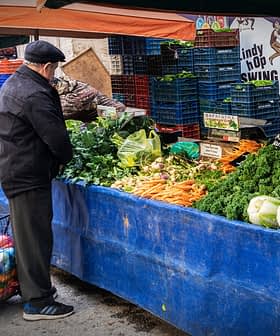
The decimated olive oil harvest will have a big effect on Greece’s exports this year. The Greek daily newspaper Ethnos reported that Greek olive oil production has dropped as much as 50 percent in the biggest olive oil producing regions. Weather and other natural conditions are being blamed for destroying crops during a critical point of the olive oil season.
Affected Regions
On the olive oil producing island of Lesvos, production is reported to drop to 8,000 tons from 17,000 last year. The Markopoulos family runs Meropi olive oil. They produce extra virgin olive oil hailing from the mountainous, southeastern region of the island known as the Golf of Gera.
“The climate and soil make it ideal to cultivate the Kolovi olive variety which thrives in difficult kinds of soil, without much water giving us the capability to produce excellent quality olive oils,” Andreas Makropoulos of Meropi told Olive Oil Times. “However, while there were weather challenges this year, the production in Lesvos was especially affected by the dakos or olive fruit fly whose larvae feed on the fruit of olive trees.”
In Crete, another top olive oil producing region of Greece, cooperatives report that they will bring in a total of 20,000 tons, while production in an average year reaches 45,000 tons.
“We estimate up to 200 million Euros in income losses, and production is significantly lowered by up to 70 percent production,” said Dr. Nikos Michelakis, the scientific consultant of the Association of Cretan Olive Municipalities (SEDIK). “It’s a massive blow to Crete’s economy.” Michelakis added that because olive oil is Greece’s most important agricultural export, the drop in production will certainly make a mark on the nation’s already depressed economy.
Makropoulos agreed. “It will affect the Greek economy. Olive oil is one of the most exported goods in Greece and lots of families are making a living this way, dependent on olive oil production.”
As a result of the destroyed crops, many Greek companies will find it difficult to fill orders to export abroad. “Producers may lose trust from their customers because there will be a gap, a lack of production,” said Makropoulos. “Due to the situation, Greece is also giving a big advantage to Spain and Italy during a time when Greek producers were starting to show momentum in the market.”
Awaiting Aid
Many producers had turned to Greek Agricultural Insurance Organization (ELGA) to seek compensation to make up for the financial loss. However, the agency found that it cannot give aid due to the weather conditions that hit Greece. A combination of warm winds blew in from Africa with increased frequency. Temperatures skyrocketed to over 40 C or 104 F for long periods of time as well.
Some are awaiting a lengthy approval process from the European Commission which has a program that could potentially compensate olive oil producers. Michelakis estimated that payments, once approved, could take up to three years.








